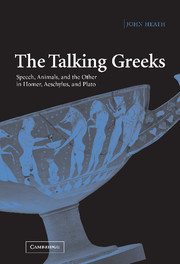Book contents
- Frontmatter
- Contents
- Preface and acknowledgments
- Introduction
- Part I SPEECH, ANIMALS, AND HUMAN STATUS IN HOMER
- Chapter 1 Bellowing like a bull: Humans and other animals in Homer
- Chapter 2 Controlling language: Telemachus learns to speak
- Chapter 3 Talking through the heroic code: Achilles learns to tell stories
- Part II LISTENING FOR THE OTHER IN CLASSICAL GREECE
- Part III SPEECH, ANIMALS, AND HUMAN STATUS IN CLASSICAL ATHENS
- Epilogue
- Bibliography
- Index
Chapter 2 - Controlling language: Telemachus learns to speak
Published online by Cambridge University Press: 22 September 2009
- Frontmatter
- Contents
- Preface and acknowledgments
- Introduction
- Part I SPEECH, ANIMALS, AND HUMAN STATUS IN HOMER
- Chapter 1 Bellowing like a bull: Humans and other animals in Homer
- Chapter 2 Controlling language: Telemachus learns to speak
- Chapter 3 Talking through the heroic code: Achilles learns to tell stories
- Part II LISTENING FOR THE OTHER IN CLASSICAL GREECE
- Part III SPEECH, ANIMALS, AND HUMAN STATUS IN CLASSICAL ATHENS
- Epilogue
- Bibliography
- Index
Summary
Polyphemus the Cyclops is the ultimate Other, and as such over the past forty years has been as thoroughly probed as his eye. Although there may still be some critical debate about the origins and significance of the various contradictory aspects of the world the one-eyed giants inhabit, there is general agreement that the episode is one of a series in which Odysseus encounters the super- and sub-human, the non-Greek. The pseudo-pastoralist Cyclopes are the epitome of the uncivilized. They are ignorant of ships and harbors, agriculture, hunting, cooking meat, cities, gift-exchange, laws, assemblies, government, blood sacrifice, and hospitality. Their woolly land, a potential golden-age paradise, is characterized by force, hubris, impiety, and cannibalism. Nature overwhelms culture, and Odysseus' triumph is in some way a victory of the civilized over the savage, the Greek over the barbarian, the human over the bestial.
In what has been labeled the most “Odyssean” of all his adventures, the hero displays his cunning intelligence (mêtis) in both verbal and non-verbal tricks to overcome his savage tormentor. Intelligence triumphs – or at least mostly triumphs – over force, and self-restraint masters – or for the most part masters – impulse. But more specifically, Odysseus emerges as a “master of language.” Odysseus uses his human command of speech to overcome the brutality of the culture-deprived monster. Polyphemus tries to outwit Odysseus in each of their three conversations, and in the first two the Cyclops mistakenly believes he has succeeded.
Information
- Type
- Chapter
- Information
- The Talking GreeksSpeech, Animals, and the Other in Homer, Aeschylus, and Plato, pp. 79 - 118Publisher: Cambridge University PressPrint publication year: 2005
